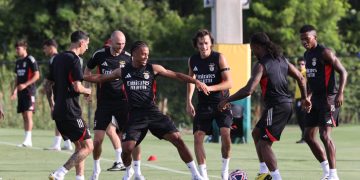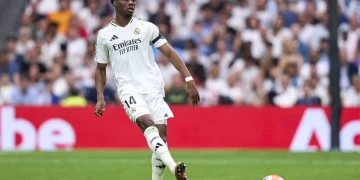Introduction
Liverpool Football Club, under the management of Jürgen Klopp, has enjoyed a period of immense success over the past few seasons, both domestically and internationally. The Reds’ attacking prowess, led by stars like Mohamed Salah, Sadio Mané, and Roberto Firmino, combined with a high-pressing style of play, has been the hallmark of Klopp’s philosophy. However, one area of the team that has raised growing concern is their defense.
Liverpool’s defensive frailties have become more apparent in recent seasons, especially after their Champions League victory in 2019 and their Premier League title in 2020. Once regarded as one of the best defenses in Europe, the Liverpool backline has struggled with consistency, form, and injuries, leading to questions about whether Klopp’s defense-first strategy can still work in the modern game. With the emergence of teams like Manchester City, Chelsea, and Manchester United, who have bolstered their defensive setups, the Reds will need to address these issues if they want to maintain their status as title contenders in the Premier League and Europe.
This article will delve into the underlying problems in Liverpool’s defense, analyze the key players involved, and evaluate whether Klopp can fix these issues to bring stability back to his defense.
Chapter 1: The Glory Years – When Liverpool’s Defense Was Their Fortress
Under Jürgen Klopp, Liverpool achieved remarkable success, and much of that success was built on a rock-solid defense. The central partnership of Virgil van Dijk and Joel Matip, along with full-backs like Trent Alexander-Arnold and Andrew Robertson, was a crucial element of Liverpool’s defensive strength. The Reds were not only compact defensively but were also highly effective at launching counter-attacks, thanks to their speed and offensive full-backs.
- Virgil van Dijk, in particular, transformed Liverpool’s defense, becoming one of the world’s best central defenders since joining the club in 2018. His leadership, aerial ability, and composure on the ball were key to Liverpool’s defensive solidity.
- Trent Alexander-Arnold and Andrew Robertson, two of the best attacking full-backs in world football, provided width and service from the flanks, while also being disciplined in their defensive duties.
During Liverpool’s Champions League-winning campaign in 2018-19, and their Premier League title-winning season in 2019-20, their defense was often impenetrable. The Reds conceded only 33 goals in the league during the 2019-2020 season, the fewest in the division, and conceded just 22 goals during their 2018-19 Champions League run.
This chapter will reflect on how Liverpool’s defensive system worked during these glory years and why it was so effective. We will also examine how injuries and changes in personnel have contributed to the decline in their defensive stability in recent seasons.
Chapter 2: The Decline in Defensive Consistency – Injuries and Individual Errors
The 2020-2021 season marked a major turning point for Liverpool’s defense. After their historic title win in 2020, the Reds encountered a series of challenges that led to a significant dip in their defensive performance:
- Injuries to Key Players: The first major blow came when Virgil van Dijk suffered a season-ending ACL injury in October 2020 during a clash with Everton’s Jordan Pickford. The absence of the Dutchman, who was arguably the best central defender in the world at the time, had a domino effect on the team. Without van Dijk’s leadership, Liverpool’s defense looked disorganized, and they conceded far more goals than they had in the past. In addition to van Dijk’s injury, Joe Gomez also suffered a long-term injury, leaving the team with only Joel Matip as a reliable central defender. This forced Klopp to experiment with midfielders like Fabinho and Jordan Henderson playing in defense, leading to a lack of cohesion and balance at the back.
- Defensive Missteps and Lack of Depth: Even when Klopp’s regular defenders were fit, Liverpool’s defense began to show signs of vulnerability. The usually composed Alisson Becker started making mistakes, such as his high-profile errors in matches against Leeds United and Manchester City in 2021. Moreover, Trent Alexander-Arnold, despite his incredible offensive contributions, was often criticized for his defensive positioning and lack of recovery pace at times.
- Lack of Competition for Starting Spots: For a team with such high aspirations, Liverpool struggled with depth in their defensive line. While players like Kostas Tsimikas provided a solid option as a backup to Robertson, the overall squad depth, especially in central defense, was thin. Without strong competition for spots, some players, especially those on the fringe, failed to rise to the occasion when called upon.
This chapter will explore the key issues that caused Liverpool’s defensive decline, particularly focusing on the impact of injuries, the lack of depth in key positions, and the inconsistent performances from individual players.
Chapter 3: Klopp’s Tactical Adaptations – Is the High Line Still Effective?
One of the hallmarks of Klopp’s system is the high defensive line, which is designed to squeeze the play and support the team’s pressing game. While this tactic has worked wonders in certain matches, it has also exposed vulnerabilities in Liverpool’s defense, particularly when the team is caught out of position or when facing a team with quick attackers.
In recent seasons, Liverpool has been exploited by opponents who know how to break the high press, particularly those with fast and direct attackers. Teams like Atalanta, Manchester City, and Leeds United have exploited Liverpool’s high line, causing defensive chaos and scoring goals on the counter-attack.
Moreover, Alisson Becker’s decision-making in one-on-one situations and his high-line sweeper-keeper role has at times caused panic at the back, adding to the instability.
This chapter will analyze Klopp’s tactical approach to defending and whether the high line remains effective with the current squad. It will also explore how Klopp might need to adjust his defensive strategies to adapt to modern football, particularly against teams that can exploit spaces left open by Liverpool’s attacking style.
Chapter 4: The Current Defensive Personnel – Who is to Blame?
As of the 2021-2022 season, Liverpool’s defense has experienced a resurgence, with van Dijk returning from injury, and new signings like Ibrahima Konaté providing depth. However, even with these improvements, the defense has continued to show vulnerabilities.
Let’s assess the current defensive personnel:
- Virgil van Dijk: Arguably the best central defender in the world when fit, van Dijk’s return has been a massive boost for Liverpool. His leadership, aerial dominance, and composure on the ball are unmatched, but the question remains whether he can return to his pre-injury level.
- Joel Matip: Matip is one of Liverpool’s most underrated defenders, with his calmness under pressure and ability to bring the ball out from the back. However, his injury record has been problematic, and his consistency can sometimes be questioned.
- Ibrahima Konaté: The Frenchman was signed in 2021 as a long-term solution to Liverpool’s defensive depth issues. While Konaté has shown his potential, he is still adjusting to the pace and physicality of the Premier League. His raw talent and strength are undeniable, but whether he can become a consistent partner for van Dijk is yet to be fully realized.
- Trent Alexander-Arnold and Andrew Robertson: As mentioned, both full-backs are brilliant going forward, but they are occasionally exposed defensively. Alexander-Arnold, in particular, has been targeted by opponents due to his positioning when defending counter-attacks.
- Alisson Becker: The Brazilian goalkeeper is world-class, but his occasional lapses in concentration and errors with the ball at his feet have contributed to defensive instability. His role as a sweeper-keeper also comes with risk, especially when he is caught out of position.
This chapter will analyze the strengths and weaknesses of each key defensive player and evaluate whether the current personnel can meet the demands of Klopp’s system and improve Liverpool’s defensive stability.

Chapter 5: Potential Solutions – What Can Klopp Do to Fix the Defensive Woes?
With the new season underway, Klopp faces a critical challenge in ensuring that Liverpool’s defense is as solid as it was in the past. While the attacking brilliance of Salah, Mane, and Jota can take the team far, the defense must be reliable if Liverpool is to challenge for the Premier League and the Champions League.
Key potential solutions include:
- Tactical Adjustments: Klopp may need to adjust his high press and defensive line strategy to be more adaptable against teams that can exploit these areas. A more balanced approach, with occasional deep defending, could help reduce vulnerabilities.
- Squad Rotation and Depth: Liverpool must ensure that there is adequate depth in the defensive positions. Konaté should be given more opportunities to develop, and Liverpool could explore signing an additional center-back to provide competition for starting spots.
- Focus on Full-Back Defending: While Alexander-Arnold and Robertson’s attacking contributions are invaluable, they must improve their defensive awareness, particularly when defending counter-attacks. Klopp could work on ensuring that the full-backs are more disciplined in their positioning.
- Better Goalkeeping Decision-Making:
Alisson is one of the best in the world, but occasional errors have crept into his game. Working on his decision-making in high-pressure situations could help reduce costly mistakes.
Conclusion: Can Liverpool Fix Their Defensive Issues?
Liverpool’s defensive instability in recent seasons has been a notable concern, especially given the club’s immense attacking talent. However, with Virgil van Dijk’s return to full fitness and the addition of new defensive options, Klopp has the opportunity to restore balance to his team.
Ultimately, whether Liverpool can resolve their defensive issues will depend on how well they adjust tactically, the consistency of their key defenders, and their ability to deal with injuries. If Klopp can find a way to balance his trademark attacking philosophy with a more secure defensive structure, Liverpool will once again be a force to be reckoned with on both domestic and European fronts.
Time will tell if the Reds can rediscover their defensive solidity and challenge for major honors once again. But for Liverpool fans, the hope is that their defense can be the foundation upon which future success is built.






























Discussion about this post